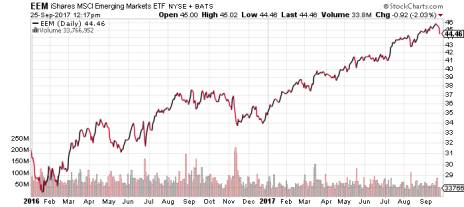Emerging market stocks have been in an uptrend for a long time, and it’s been profitable and great fun. Given the number and severity of the challenges the market has faced, there’s no reason it shouldn’t go on rallying into the future.
That’s on the one hand.
On the other hand, there is an “emerging” consensus among stock analysts and commentators that emerging market stocks are the place to be, especially glamour stocks like Alibaba (BABA) and Tencent Holdings (TCEHY). And many years of experience has taught me over the years that once everyone in the market believes some asset or asset class is a sure thing, that thing is in potential danger.
[text_ad]
Don’t get me wrong. I agree that the situation is excellent and that there isn’t a reason in the world I can think of that emerging market stocks shouldn’t continue to thrive, with Alibaba, Tencent and our other holdings leading the way.
But markets, which climb a wall of worry, are notoriously dangerous when investors stop worrying.
So my message to you today is the same one the football coach at my high school in Medford, Oregon used to deliver to his players when they went into the locker room at halftime with a big lead: “Don’t get cocky!” (I was in the band, of course, so this is hearsay.)
But if you look at this chart of iShares MSCI Emerging Markets ETF (EEM), which is the basis of our market timing indicator, you’ll see how long it’s been since we’ve had a correction big enough to really shake people’s confidence in emerging market stocks. (I started the chart in January 2016 to emphasize the length of the rally.)
While I have never been convinced by the critics who see a long rally and a big profit as an infallible indicator of a coming disaster, I know that eventually we will get a major correction. And that when the correction occurs, it will be good for your portfolio if you have taken partial profits along the way.
I also know that all of the subscribers to my Cabot Global Stocks Explorer (formerly Cabot Emerging Markets Investor) advisory will have bought at different times and will have different profit levels. So my advice is to make it a practice to take a little profit from time to time. If you have a stock that has doubled, think seriously about selling a third or a half of your position and booking that profit. Even with smaller-but-solid gains you can consider taking a few shares off the table.
Talking to attendees at last week’s Cabot Wealth Summit got me thinking about how good we all feel about the robust good health of emerging market stocks. And that led inevitably to anxiety about when (not if) the next bear will stick its nose into the tent. So enjoy the ride, but be responsible and act accordingly, too.
*This post was excerpted from the September 21 issue of Cabot Global Stocks Explorer. To subscribe, click here.
[author_ad]

